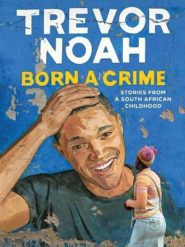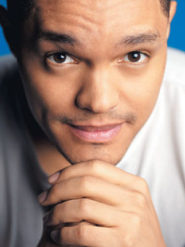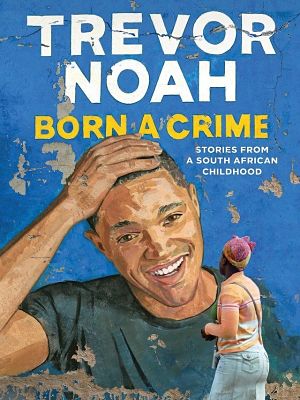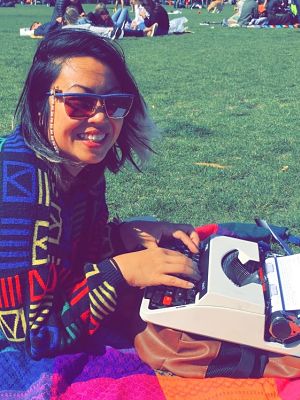Writers Read: Born a Crime: Stories from a South African Childhood by Trevor Noah
 If the title of his childhood memoir needs clarification, before launching into his story of what it was like to grow up at the end of apartheid in South Africa, Trevor Noah includes conditions of the Immorality Act, 1927: The act of “illicit carnal intercourse” between a [white] European with a [black] native “shall be guilty of an offence and liable on conviction to imprisonment for a period not exceeding five years” for males or four years for females. In the eponymous second chapter, we learn more about his parentage: a black mother and a white father whose “crime” took living form when Noah was born. Unwilling to let government rule dictate her life, Patricia Nombuyiselo Noah, at 24-years-old wanted a child of her own that she could love, and sought the sperm donation of an older Swiss neighbor with whom she had a caring relationship but was not necessarily interested in being a family with him.
If the title of his childhood memoir needs clarification, before launching into his story of what it was like to grow up at the end of apartheid in South Africa, Trevor Noah includes conditions of the Immorality Act, 1927: The act of “illicit carnal intercourse” between a [white] European with a [black] native “shall be guilty of an offence and liable on conviction to imprisonment for a period not exceeding five years” for males or four years for females. In the eponymous second chapter, we learn more about his parentage: a black mother and a white father whose “crime” took living form when Noah was born. Unwilling to let government rule dictate her life, Patricia Nombuyiselo Noah, at 24-years-old wanted a child of her own that she could love, and sought the sperm donation of an older Swiss neighbor with whom she had a caring relationship but was not necessarily interested in being a family with him.
Headstrong with a healthy sense of humor and the grace of God on her side, Patricia raised her son to never feel held back by racial discrimination, even when he would have to walk on the opposite side of the street of his father when they spent an afternoon together; even when a colored neighbor would tag along to the playground so she could act as his mother while his mom would pretend to be a domestic. In his own family, he even benefitted from it; though he didn’t realize it when he was younger, being the light-skinned member of his African family he experienced privilege above his cousins in the form of more lenient punishments for worse offenses and special treatment just for showing up. “Growing up the way I did, I learned how easy it is for white people to get comfortable with a system that awards them all the perks,” Noah admits.
Among many traits he inherits from his mother is “her ability to forget the pain in life. I remember the thing that caused the trauma, but I don’t hold on to the trauma. I never let the memory of something painful prevent me from trying something new.” Noah’s emotional amnesia allows him to get into trouble and work his way around systems that weren’t meant to work for him while reliving the often uncomfortable experiences through writing them.
A strength of a memoir is to be both unique and universal. With his rare position, Noah shares lighthearted accounts of dark moments in the recent history of racial inequalities. As he recounts being on the playground and having to pick whether he hangs out with the black or white or Indian or colored kids, up until he faces a similar choice when he finds himself in jail for taking his stepfather’s car, he relates his circumstances in South Africa to what has happened in other countries. “In America you had the forced removal of the native onto reservations coupled with slavery followed by segregation. Imagine all three of those things happening to the same group of people at the same time. That was apartheid.”
While Noah makes his experiences more accessible to American readers, he also acknowledges the deficits in educating about civil injustices. At the beginning of Part III which covers his later teens and early twenties, Noah addresses how German students learn about the gravity of the Holocaust and British schools teach colonialism with a disclaimer of shame, while South Africa follows American philosophies of handling race. “In America, the history of racism is taught like this: ‘There was slavery and then there was Jim Crow and then there was Martin Luther King Jr. and now it’s done.’ It was the same for us. ‘Apartheid was bad. Nelson Mandela was freed. Let’s move on.’ Facts, but not many, and never the emotional or moral dimension. It was as if the teachers, many of whom were white, had been given a mandate. ‘Whatever you do, don’t make the kids angry.’” This preamble leads into a chapter called “Go Hitler!”

Trevor Noah
Throughout Noah’s story, he discusses how his culture assigns names to children based on what traits their parents wish for them to possess. His mom chose Trevor because it had no prior associations so he could be whomever he wanted. On the other hand, for parents that wanted a tough kid, they would call him Hitler. The shortcoming of the education systems in Noah’s townships didn’t sufficiently teach the atrocities of Adolf Hitler, but rather merely presented him as a figure so powerful that the white people needed black people to help fight him. This goes without saying, but while Hitler and the Holocaust are off limits for jokes, the irony is both too rich and terrifying to omit the scene of township teens cheering on their top dancer, Hitler, at a cultural exhibition held at King David School. When a teacher reprimands Noah’s dance crew for being horrible and vile, which, with his ignorance about what terrors befell the ancestors of the Jewish students of the school, he assumes is about the sexually suggestive gyrations that were a part of the dance that represents his culture, he reciprocates outrage that she would dare disrespect their African moves during an inter-cultural celebration.
It may be hard to believe that none of Noah’s peers would understand how inappropriate it might be to cheer for Hitler at a Jewish school, but he reminds us: “The name Hitler does not offend a black South African because Hitler is not the worst thing a black South African can imagine. Every country thinks their history is the most important, and that’s especially true in the West. But if black South Africans could go back in time and kill one person, Cecil Rhodes would come up before Hitler. If people in the Congo could go back in time and kill one person, Belgium’s King Leopold would come way before Hitler. If Native Americans could go back in time and kill one person, it would probably be Christopher Columbus or Andrew Jackson.” Without diminishing the experiences of Holocaust victims or playing “Who suffered worse?”, Noah shows us some of the other big names in the recent history of racism—names that might be as reviled as they are respected.
We keep hoping that racial divides and racism are matters of the past, but too often reminded how prevalent they are in our present. Just as contemporary black South Africans may continue to feel the impact of Rhodes’ contributions to apartheid, we cannot allow ourselves to feel complacent about persistent oppression at home and on a global scale.
Noah, Trevor. Born a Crime: Stories From a South African Childhood. First edition. Spiegel & Grau, 2016.


 Nikki San Pedro is a Los Angeles based editor who recently worked on Kevin Hart’s memoir I Can’t Make This Up: Life Lessons, as well as a couple of essay anthologies published by 826LA. You can read about her experiences in the August blog post for Embark Editorial Agency. She is completing her MFA in Creative Writing for Social Justice at Antioch University.
Nikki San Pedro is a Los Angeles based editor who recently worked on Kevin Hart’s memoir I Can’t Make This Up: Life Lessons, as well as a couple of essay anthologies published by 826LA. You can read about her experiences in the August blog post for Embark Editorial Agency. She is completing her MFA in Creative Writing for Social Justice at Antioch University.


